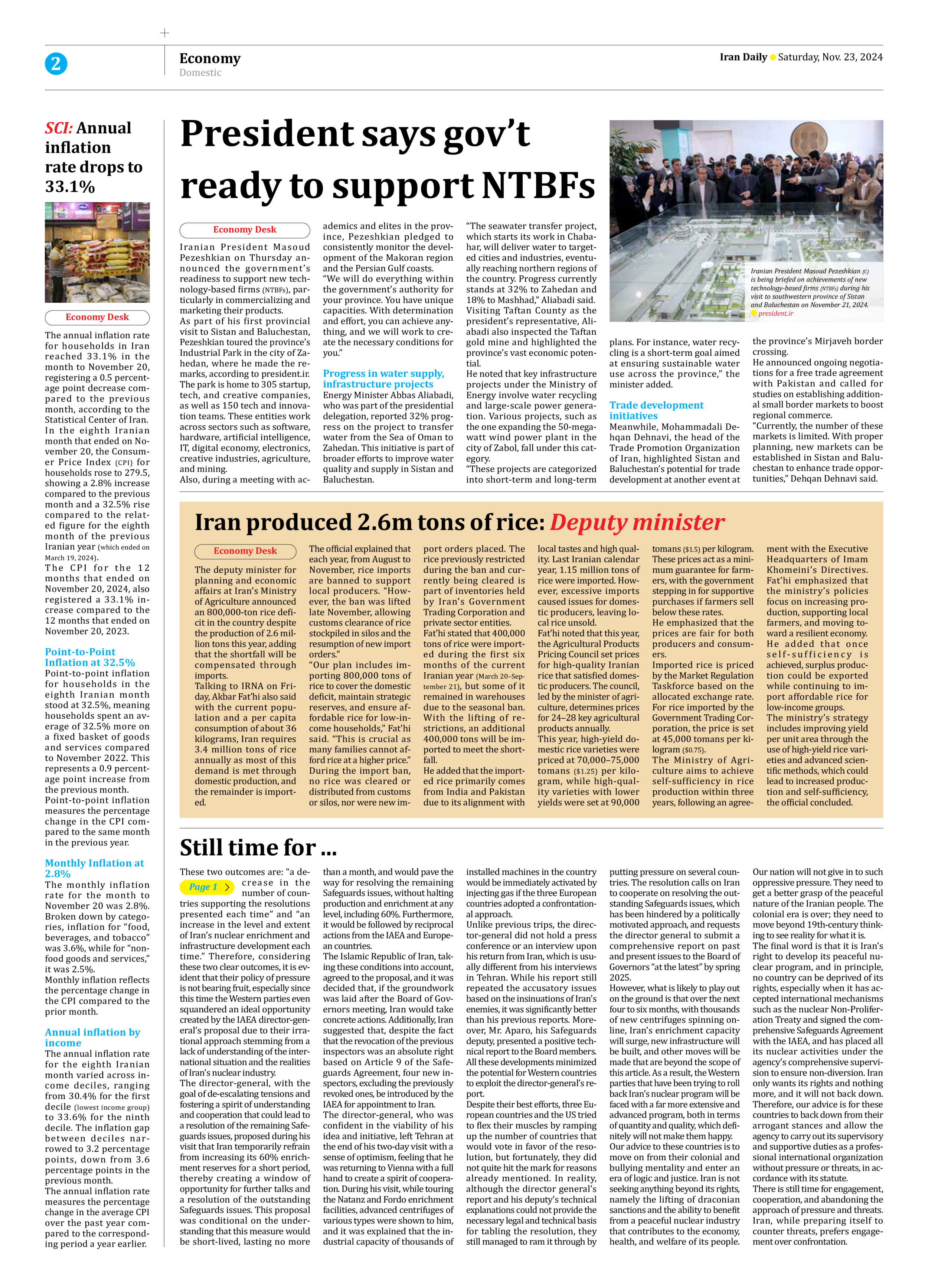
Still time for ...
Page 1
These two outcomes are: “a decrease in the number of countries supporting the resolutions presented each time” and “an increase in the level and extent of Iran’s nuclear enrichment and infrastructure development each time.” Therefore, considering these two clear outcomes, it is evident that their policy of pressure is not bearing fruit, especially since this time the Western parties even squandered an ideal opportunity created by the IAEA director-general’s proposal due to their irrational approach stemming from a lack of understanding of the international situation and the realities of Iran’s nuclear industry.
The director-general, with the goal of de-escalating tensions and fostering a spirit of understanding and cooperation that could lead to a resolution of the remaining Safeguards issues, proposed during his visit that Iran temporarily refrain from increasing its 60% enrichment reserves for a short period, thereby creating a window of opportunity for further talks and a resolution of the outstanding Safeguards issues. This proposal was conditional on the understanding that this measure would be short-lived, lasting no more than a month, and would pave the way for resolving the remaining Safeguards issues, without halting production and enrichment at any level, including 60%. Furthermore, it would be followed by reciprocal actions from the IAEA and European countries.
The Islamic Republic of Iran, taking these conditions into account, agreed to the proposal, and it was decided that, if the groundwork was laid after the Board of Governors meeting, Iran would take concrete actions. Additionally, Iran suggested that, despite the fact that the revocation of the previous inspectors was an absolute right based on Article 9 of the Safeguards Agreement, four new inspectors, excluding the previously revoked ones, be introduced by the IAEA for appointment to Iran.
The director-general, who was confident in the viability of his idea and initiative, left Tehran at the end of his two-day visit with a sense of optimism, feeling that he was returning to Vienna with a full hand to create a spirit of cooperation. During his visit, while touring the Natanz and Fordo enrichment facilities, advanced centrifuges of various types were shown to him, and it was explained that the industrial capacity of thousands of installed machines in the country would be immediately activated by injecting gas if the three European countries adopted a confrontational approach.
Unlike previous trips, the director-general did not hold a press conference or an interview upon his return from Iran, which is usually different from his interviews in Tehran. While his report still repeated the accusatory issues based on the insinuations of Iran’s enemies, it was significantly better than his previous reports. Moreover, Mr. Aparo, his Safeguards deputy, presented a positive technical report to the Board members. All these developments minimized the potential for Western countries to exploit the director-general’s report.
Despite their best efforts, three European countries and the US tried to flex their muscles by ramping up the number of countries that would vote in favor of the resolution, but fortunately, they did not quite hit the mark for reasons already mentioned. In reality, although the director general’s report and his deputy’s technical explanations could not provide the necessary legal and technical basis for tabling the resolution, they still managed to ram it through by putting pressure on several countries. The resolution calls on Iran to cooperate on resolving the outstanding Safeguards issues, which has been hindered by a politically motivated approach, and requests the director general to submit a comprehensive report on past and present issues to the Board of Governors “at the latest” by spring 2025.
However, what is likely to play out on the ground is that over the next four to six months, with thousands of new centrifuges spinning online, Iran’s enrichment capacity will surge, new infrastructure will be built, and other moves will be made that are beyond the scope of this article. As a result, the Western parties that have been trying to roll back Iran’s nuclear program will be faced with a far more extensive and advanced program, both in terms of quantity and quality, which definitely will not make them happy.
Our advice to these countries is to move on from their colonial and bullying mentality and enter an era of logic and justice. Iran is not seeking anything beyond its rights, namely the lifting of draconian sanctions and the ability to benefit from a peaceful nuclear industry that contributes to the economy, health, and welfare of its people. Our nation will not give in to such oppressive pressure. They need to get a better grasp of the peaceful nature of the Iranian people. The colonial era is over; they need to move beyond 19th-century thinking to see reality for what it is.
The final word is that it is Iran’s right to develop its peaceful nuclear program, and in principle, no country can be deprived of its rights, especially when it has accepted international mechanisms such as the nuclear Non-Proliferation Treaty and signed the comprehensive Safeguards Agreement with the IAEA, and has placed all its nuclear activities under the agency’s comprehensive supervision to ensure non-diversion. Iran only wants its rights and nothing more, and it will not back down. Therefore, our advice is for these countries to back down from their arrogant stances and allow the agency to carry out its supervisory and supportive duties as a professional international organization without pressure or threats, in accordance with its statute.
There is still time for engagement, cooperation, and abandoning the approach of pressure and threats. Iran, while preparing itself to counter threats, prefers engagement over confrontation.







